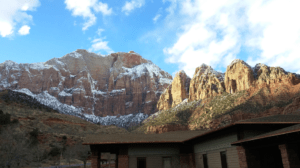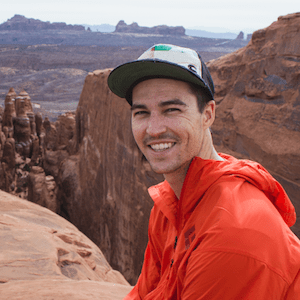By Cody Lutz for EDRBlog.org

As a graduate student fellow with the Environmental Dispute Resolution (EDR) Program, I’ve been working on various community-based conflicts and challenges. One such challenge has been helping the Town of Springdale, Utah (just outside the south entrance of Zion National Park) to engage stakeholders in a collaborative process to address concerns related to hotel and lodging development since January 2017. When I attended TEDx Salt Lake City in September 2017, I couldn’t help but notice the parallels of Philip Bimstein’s (former mayor of Springdale) talk to EDR’s own approach to problem solving with the community. Bimstein’s use of musical metaphors struck a chord within me, though I’m not much of a musician myself beyond a ditty or two on the harmonica.
The concepts and examples shared in the talk fall under three main pieces of advice: 1) listen to the whole band; 2) hear the music of dialogue; and 3) tune in to the sound of common ground. These principles are also considered best practices in interest-based, mutual gains negotiation. Bimstein echoes Michael Wheeler’s The Art of Negotiation that, “by emulating what jazz masters do, we all can become better negotiators,” noting that you’ve got to listen to the whole band if you want to say something. Through dialogue (in music and collaboration), themes and positions are reconsidered, reframed, and transformed. Finally, the mayor emeritus says that there are no wrong notes, you just need to listen for the note that has a place in both chords to compose the sound of common ground.
Here’s how we applied these principles to our work in Springdale:
LISTEN TO THE WHOLE BAND
Increases in visitation and hotel development have been driving concerns about the town’s character and livability. When the EDR program was brought in, our first step was to interview several residents, business owners, and other stakeholders to better understand the history and context of lodging development in Springdale, along with key sources of concern. We made a special effort to reach a diverse range of perspectives on the subject. Excluding (intentionally or unintentionally) a voice from a collaborative process is like having a short in your headphones that causes part of a song, such as the base guitar, to cut out. While you can still recognize the song, you’re not getting the whole experience. That’s what we were trying to avoid.
Get notified when new articles are posted to the EDR blog – sign up for our email list »
We used these interviews to create a situation assessment and inform the structure and agenda of a community forum. One thing that became clear from our conversations was that there was some confusion about a recent unpopular development resulting from a decades old lawsuit, so we knew that we should clear the air right away in the forum. We also disseminated a survey after the forum for stakeholders who couldn’t make it to the “concert.”
HEAR THE MUSIC OF DIALOGUE
During the Town Forum on Lodging and Community Character, the Director of Community Development started by sharing background information with the participants, so that everyone understood the history and facts of lodging development in Springdale. We then cultivated a productive framing for the evening by noting that the town was limited in what they could do by private property rights, asking that everyone focus on interventions the town could realistically do. To encourage productive dialogue, rather than just one person spewing a monologue to everyone in attendance at once (a traditional town hall format), we asked participants to pair up or join small groups with people they don’t normally interact with to discuss their perspectives on the following questions:
- What is special about Springdale that you want to preserve and/or enhance?
- Think about the existing lodging in town (or elsewhere)—what are the things you like?
- If there is going to be lodging in town, what can the town realistically do to enhance the good things and minimize the bad things?
Participant-validated ground rules, such as “one person speaks at a time,” “everyone has an equal right to talk,” and “challenge ideas, not people,” helped to keep the conversation productive in small groups and during open discussion.
TUNE IN TO THE SOUND OF COMMON GROUND
By encouraging people to reflect more deeply about their positions on lodging development to uncover their interests and values related to the issue, we identified a source of common ground within the community: an overall desire to preserve the special character of the town by protecting and enhancing its “village feel” and limiting traffic congestion. There was also a shared sense of feeling overwhelmed by the growth in visitation in the community. Contrastingly, we also conveyed the presence of many different priorities related to lodging development held by different stakeholders. In our experience as facilitators, we’ve found that “calling out” sources of conflict can sometimes reduce tension and enable stakeholders to more directly address an issue. In this instance, we were also trying to convey that Springdale was juggling different opinions, not ignoring some perceived consensus.
After the community forum, the work on developing a fair, efficient, stable, and wise approach to managing hotel development in Springdale was far from over. We left the town with our insights on the issue and a recommendation to form a professionally facilitated “lodging task force” to examine the current ordinances and explore strategies to update the ordinances to align with the community’s vision and priorities. The task force is expected to be up and running in the next month, and to have some recommendations prepared later this spring.
CONCLUSION
By listening to the diverse voices of the community, fostering productive dialogue, and identifying shared values, we were able to better understand the challenge of lodging development in Springdale. I also believe we helped to clear the air and to shift the community conversation in a positive direction. I look forward to more intentionally utilizing this as a framework in my next public engagement or dispute resolution process. As Mayor Bimstein said, we are the composers of our world. How can you keep “music in mind” in your next collaborative process?
 BIO:
BIO:
Cody Lutz is Master of City and Metropolitan Planning candidate at The U. He is a fellow of the Environmental Dispute Resolution Program and a National Institute of Transportation and Communities Student Scholar Fellow. Cody plans to apply interest-based collaboration to his future work in natural resource management, land use planning, and community building.
